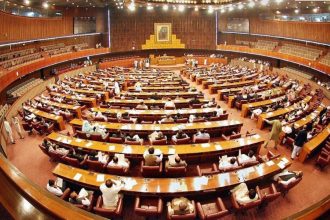Karachi: More than 50 birds and a pair of monkeys brought to the Empress Market on Monday for sale were confiscated in a raid conducted by the wildlife department.
All confiscated animals, currently being kept at the wildlife department office, are protected under the Sindh Wildlife Protection Ordinance, 1972.
The confiscated birds consisted of 20 chakors, 18 wild doves, eight black partridges, four grey partridges and two flamingoes.
“Two people, identified as Sherzaman and Hashim Morio, have been arrested while two others escaped,” said Rasheed Ahmed Khan, game officer heading the raiding team.
A case has been registered while investigation is in progress, he added.
Upon contact, conservator wildlife Saeed Akhtar Baloch said that all the birds, except for the flamingoes, would be released soon near the Hub dam, said to be the birds habitat.
“The flamingoes would be released in the Haleji Lake sanctuary whereas the rhesus monkeys would be handed over to the zoo since the habitat of these primates doesn’t exist in Sindh,” he said.
In response to a question regarding the animals’ captivity at the wildlife department office, he pointed out that Sindh was the only province in the country where zoos didn’t operate under the wildlife department.
“All over the world, zoos are part of the wildlife department (and they don’t need a separate facility to keep confiscated animals). Since this is not the case in Sindh, we will make a proposal to acquire a place for keeping confiscated animals,” he explained.
The suspects, he said, would be fined in order to ensure early release of the birds in the wild as taking the case to court could delay the release process, and put their lives at risk.
It is worth noting that the commissioner of Karachi has repeatedly asked the wildlife department to take action against the increasing illegal sale of animals in the city. But, for some reason, no action has been taken.
The commissioner has given these directives in meetings of the zoo advisory committee that he heads.
Speaking on condition of anonymity, a wildlife officer said that ‘raid and arrest’ was no solution to the illegal sale of animals prevalent on a large scale in the province unless the government first attempts to bring the people involved within the ambit of the law.
“Animals of all kinds are raised in captivity all over the world and sold, and people involved in the business are issued licences by the government for this purpose,” he said, suggesting that the government do the same here.
The government, in his opinion, should give licences on the condition that the species must have a legal source. That meant it should be raised in captivity and not captured from the wild.
“This would encourage breeding of animals that we are losing or have lost in the wild, besides providing a source of income to people. But I don’t think we would ever introduce such a procedure as it would end the role of ‘bhatta mafia’,” he said.
According to him, one major obstacle in the way of curbing illegal wildlife trade is the presence of an obsolete law.
“The proposed draft on the updated wildlife law has been awaiting government approval for more than four years. It appears that the provincial government has no political will to bring a strong law, giving effective powers to the toothless wildlife department,” he said.





